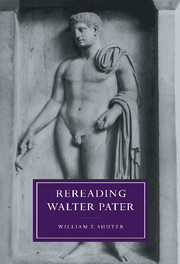Book contents
- Frontmatter
- Contents
- Preface
- Frequently cited sources and abbreviations
- Introduction: an initial reading
- 1 The periegetic critic and the imaginative sense of place
- 2 The retrojective apologist
- 3 Heraclitus, Hegel, and Plato
- 4 The dubious academic
- 5 Visiting the dead
- Conclusion: rereading, revising, and reshuffling
- Notes
- Bibliography
- Index
- Miscellaneous Endmatter
4 - The dubious academic
Published online by Cambridge University Press: 22 October 2009
- Frontmatter
- Contents
- Preface
- Frequently cited sources and abbreviations
- Introduction: an initial reading
- 1 The periegetic critic and the imaginative sense of place
- 2 The retrojective apologist
- 3 Heraclitus, Hegel, and Plato
- 4 The dubious academic
- 5 Visiting the dead
- Conclusion: rereading, revising, and reshuffling
- Notes
- Bibliography
- Index
- Miscellaneous Endmatter
Summary
Our initial reading led us to conclude that as he grew older Pater grew more cautious, retreating from the intellectually venturesome and morally daring positions of his youth and deferring to the authority of inherited tradition or of established convention. And we took as one indication of this change the older Pater's quite explicit interest in the value of formal education. Of course the younger Pater was, like the older Pater, a don, but an initial reading has difficulty thinking of him in that capacity. In part this is because our information about Pater's teaching derives largely from anecdotes that represent him as preoccupied with other than academic concerns. We remember, for example, that on one occasion he was unable to recall anything of the scholarship examinations he had read except the evocative name Sanctuary of one of the candidates, and that when asked if the horseplay of the undergraduates disturbed him, he responded, “Oh! no; I rather enjoy it. They are like playful young tigers, that have been fed.” Taken in conjunction with Benson's observation that Pater “did not consider himself a professional educator,” these stories confirm our impression of Pater as a reluctant and therefore a disengaged or indulgent educator. It was of course not his temperament alone that explains Pater's apparent estrangement from the institutional life of Oxford. When his Studies in the History of the Renaissance appeared in 1873, many at Oxford were scandalized and continued to regard him with distrust and suspicion. It would therefore seem probable that the ironic detachment with which he exercised the functions of a don represented Pater's response to the uncongenial environment of Victorian Oxford.
- Type
- Chapter
- Information
- Rereading Walter Pater , pp. 78 - 91Publisher: Cambridge University PressPrint publication year: 1997

